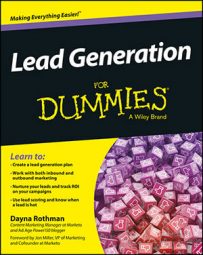Customer relationship management (CRM) software is easy to integrate into a lead generation strategy because this is something you most likely already have this in place. This is the technology your sales team uses to track leads, opportunities, and deals. Additionally, some marketing departments might also be using a CRM currently to track programs and send emails.
However, note that a CRM tool was not made exclusively for marketers, and thus is not an ideal solution for your lead generating efforts. The solution you should choose to track your campaigns should primarily target the needs of marketers, like a marketing automation-specific application or an email service provider.
If you do have a CRM, it is important to know what you are using, how things are currently tracked, and how that system might integrate with other technology solutions you plan on implementing. Most CRM systems integrate quite nicely with a suite of marketing technologies.
No matter what software you as a marketer decide to use for your own lead generation efforts, leads should ultimately be transferred to your CRM so that your sales team can eventually take over the sales process when a lead is ready to buy.
Having a CRM in place ensures a closed-loop lead generation strategy with maximum sales and marketing alignment.
Salesforce CRM: Salesforce is arguably the most well-known CRM software on the market today. It is cloud-based, which makes it accessible and cost-effective for businesses of all sizes. It is also built to be incredibly scalable. Salesforce excels by having a robust functionality and the ability to customize the application to fit your business needs. The user interface is also easy to understand, and you can access data from mobile and tablet devices. Another great thing about Salesforce is that it integrates with many different partners and other technology providers quickly and easily.
Microsoft Dynamics CRM: The benefit to implementing a solution like Microsoft Dynamics CRM is that it integrates nicely with other Microsoft solutions such as Office and SharePoint. As a result, you get a consistent user experience across multiple Microsoft platforms. Dynamics is also easy to use and has powerful reporting capabilities that integrate with Microsoft Excel. Dynamics also backs up its software with a service-level agreement (SLA) that promises 99.9 percent uptime, which is more than what many of the other CRM providers offer.
SugarCRM: This is a great solution for the business on a budget. SugarCRM provides an excellent user interface and really easy drag-and-drop features. It also has an out-of-the-box integration with Google and Microsoft products. Another great feature is that you can choose to deploy your instance in the cloud or on-premise. A wide range of social functionalities are also built in, such as the ability to gather intelligence on how leads are interacting with you on social channels.

